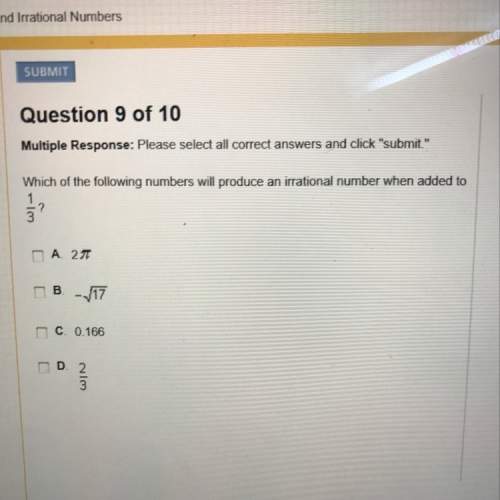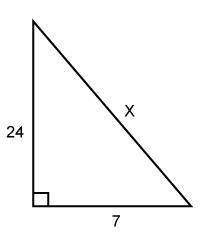Which of the following numbers will produce an irrational number when added to 1/3
...

Mathematics, 12.10.2019 09:10 lucas2020197
Which of the following numbers will produce an irrational number when added to 1/3


Answers: 2


Another question on Mathematics

Mathematics, 21.06.2019 13:20
The ratio of two numbers is 5 to 4. the sum of the numbers is 99. what number is the greater of the two numbers?
Answers: 1

Mathematics, 21.06.2019 18:30
Apsychology student wishes to investigate differences in political opinions between business majors and political science majors at her college. she randomly selects 100 students from the 260 business majors and 100 students from the 180 political science majors. does this sampling plan result in a simple random sample? why or why not? no, because each group of 200 students in the sample does not have the same chance of being selected. yes, because each group of 200 students in the sample has the same chance of being selected. no, because each individual student does not have an equal chance of being selected. yes, because each individual student has the same chance of being selected.
Answers: 1

Mathematics, 22.06.2019 00:30
If a revenue in total for a month was $9,950, fixed expenses were $9,000, and variable expenses were $300 what would be the total profit/ loss for the month?
Answers: 3

Mathematics, 22.06.2019 02:00
Study published in the journal of personality and individual differences found that adults with adhd displayed more creative achievement than those who didn't have the disorder. "for the same reason that adhd might create problems, like distraction, it can also allow an openness to new ideas," says holly white, assistant professor of cognitive psychology. "not being completely focused on a task lets the mind make associations that might not have happened otherwise." white and priti shah at the university of michigan gave 60 college students – half of them with adhd – a series of tests measuring creativity across 10 domains. the adhd group scored higher across the board. the adhd group showed more of a preference for brainstorming and generating ideas than the non-adhd group, which preferred refining and clarifying ideas. the adhd status of the participants was established by asking whether the individual had ever been clinically diagnosed with adhd/add. the tests of creativity were pencil-and-paper tasks administered in a laboratory setting. each of the ten scales was comprised of multiple questions, the scores on which were summed (e.g., writing creativity: "how many words can you make from the letters in the word 'psychology' invention creativity: "write down as many uses for a paper clip that you can think of.") this procedure does allow for a participant to be scored as showing no creativity under these conditions. a) state the research question in plain language (i wonder if is related to (1 point) b) state the null hypothesis (1 point) c) state the research hypothesis (1 point) d) is the research hypothesis directional or non-directional (1 point) e) name the predictor / independent variable f) give the operational definition of the predictor / independent variable g) evaluate the construct validity of the predictor / independent variable. (face, procedure, method-match) h) name the outcome / dependent variable i) give the operational definition of the outcome / dependent variable. j) evaluate the construct validity of the outcome / dependent variable. (face, procedure, method-match)
Answers: 1
You know the right answer?
Questions

Physics, 03.11.2020 18:40




Physics, 03.11.2020 18:40

Mathematics, 03.11.2020 18:40


Mathematics, 03.11.2020 18:40

English, 03.11.2020 18:40


History, 03.11.2020 18:40


Arts, 03.11.2020 18:40


Mathematics, 03.11.2020 18:40




Mathematics, 03.11.2020 18:40




